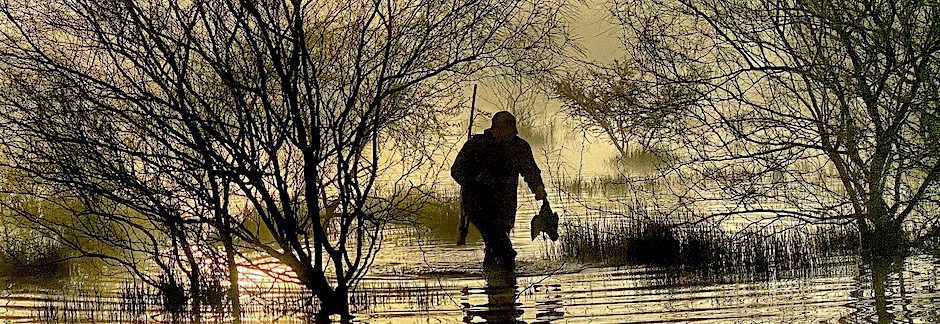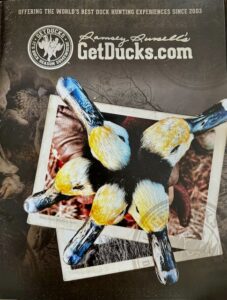MOJO’S Duck Season Somewhere Podcast
EP 434. Where the Hell Are the Ducks?!

It’s the week of Christmas. Coast to coast, north to south, everyone seems frustrated while awaiting south-bound ducks, asking themselves where in the hell are the ducks?! Is the sky falling? Do we really even have ducks? Or is the answer a little more straight forward? Waterfowl migration guru Dr. Michael Schummer explains what we’re seeing–or not! Using his proprietary forecast model, he even makes a prediction for the upcoming week.
EP 433. Waterfowl Eyesight: Seeing Things for What They Really Are











How well do ducks and geese really see–and how can understanding this make you a more effective waterfowl hunter? Dr. Bradley Cohen from Tennessee Tech explains waterfowl eyesight to Ramsey, focusing on depth perception, field of view, color discernment and rapid “refresh rates.” Citing many years of in-depth research, he paints a pretty clear picture. I mean, there’s a reason they sell camo long handles and face paint, huh? Waterfowl’s ability to hear and smell are worth mentioning, but this episode is about clearly seeing waterfowl hunting for what it really is. Or isn’t. You decide.
EP 432. Oregon Duck Hunt











Ramsey scratches Oregon off the duck hunting list, leaving on Virginia and West Virginia remaining. He recounts his visit with host Brandon Potter, who describes waterfowl opportunities, waterfowl species, hunting styles, and what it’s like living and raising family in close proximity to Portland, the most left-leaning, woke-assed city in America.
***
Correction: In Oregon, dusky geese can only legally be hunted farther east than described in this episode. The dusky goose line is east of Benton, Clackamas, Clasp, Columbia, Lane, Lincoln, Linn, Marion, Multnomah, Polk, Tillamoook, Washington and Yamhill counties. Simply put, east of the Cascades.
***
EP 431. Building a World Waterfowl Collection











Building a world waterfowl collection–and we’re talking everything–is a daunting challenge. But for hunter-scientist-curator Andy Englis, it’s just another day at the office. Why the collection and its importance, sure, but among the other interesting topics covered are his close-as-a-speartip encounter with a head hunting tribe and longest duck penises in the world. The things you learn, huh?!
*****
Recorded during a recent hunter-scientist-conservation effort in Australia. Special thanks to Safari Club International for supporting this project to conserve waterfowl and to ensure hunting in Australia and worldwide.
*****
EP 430. Australia Outback Goose Camp











It’s as hot while goose hunting as when cutting summertime Mississippi grass, plus there’s plenty dangerous critters in the field and water, but geese and ducks are flying! Australia’s outback no different than goose camps elsewhere around the world–good eats and good times are had by all. Falling in with the motley assortment of Australian goose hunters that Ramsey considers friends, he learns their stories. Tune in for a conversation that’s as likely familiar as it is entertaining and informative. And ask yourself this–how would an at-all-cost hardcore waterfowler like yourself fare at Australia Outback goose camp?!
*****
Recorded during a recent hunter-scientist-conservation effort in Australia. Special thanks to Safari Club International for supporting this project to conserve waterfowl and to ensure hunting in Australia and worldwide.
*****
EP 429. Chasing Living, Breathing Waterfowl Fossils











Waterfowl geneticist, Dr. Phil Lavretsky, Ramsey and others hunting the Australia Outback for magpie geese, whistling ducks and other endemic duck species. What makes magpie geese so unique, how are they living fossils between chicken-like birds and duck-goose-swan-type waterfowl as we know them today, and what, if any, is their relationship to reptiles and dinosaurs? Describing the importance of sampling representative species worldwide to both institutional and applied sciences, Lavretsky also recalls what lead them to Australia, memorable people and week events, hunting values in Australia and elsewhere. Informative and entertaining discussion about living fossils of the bird world and more!
*****
Recorded during a recent hunter-scientist-conservation effort in Australia. Special thanks to Safari Club International for supporting this project to conserve waterfowl and to ensure hunting in Australia and worldwide.
*****
EP 428. Family Duck Hunting Traditions Down Under











Three generations of Australian duck hunters–grandfather Ray, son Glenn, and granddaughter Kareena–describe their family’s duck hunting traditions Down Under, emphasizing why it’s important to each of them, how it has connected them to the waterfowl resource and to each other, and how they feel about its possible closure. They each share personal anti-duck hunting experiences, too! You’ll likely be surprised at how familiar Australia duck hunting is to hunting in your own back yard despite their different accents from halfway across the globe. As entertaining as it is thoughtful, this episode is a reminder of what duck hunting really means to us all.
*****
Recorded during a recent hunter-scientist-conservation effort in Australia. Special thanks to Safari Club International for supporting this project to conserve waterfowl and to ensure hunting in Australia and worldwide.
*****
EP 427. Washington Sea Duck Hunting Pioneers











Way back before trophy sea duck hunting went mainstream due to the internet and North American species contests–and in a region where the almighty mallard reigned supreme among local duck hunters–the Otto brothers began plying Washington State’s Puget Sound for the beautiful waterfowl species that most duck hunters had only seen in bird books and largely ignored. Their youthful obsession spawned lifelong passion where continuously upping their own game, sharing their world with new friends, traveling throughout the United States, carving their own decoys, mounting their own birds, better learning their own backyards and refining their techniques became a lifestyle. Today, they recall many adventures then and now, and their sea duck hunting approach to life.
EP 426. SPECIAL Into the Vault 2023











DU’s Logan Nevins and I talk about Michigan waterfowl hunting, public land duck hunting here versus there, Memphis barbecue and more before jumping Into the Vault. Wow! From hard to find collectible shotguns and once-in-a-lifetime Terry Redlin original artwork to ready-to-hunt duck boats and antique decoys, Logan takes us on an amazing tour. My advice? Just buy it for your wife’s Christmas gift–it’s the thought that counts!
EP 425. A Pacific Paradise Duck Hunting Lifestyle











Retreating from fast-paced, frenetic Seattle to tranquil Olympic Peninsula settings seemed the perfect escape even though their friends thought they were crazy. And there was just one question–how in the heck would they make a living? Now decades later, Captain Dave and Tiffany Drewry recount building a life and the hugely successful Peninsula Sportsman guide service in their Washington State Pacific paradise, describing unique island culture, nearby Port Townsend, sea duck species, hunting techniques, food, hospitality, inevitable changes.


















